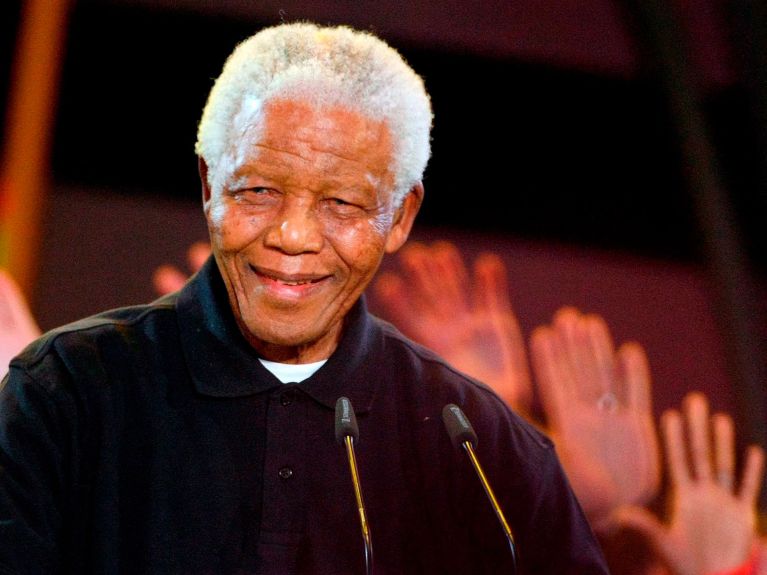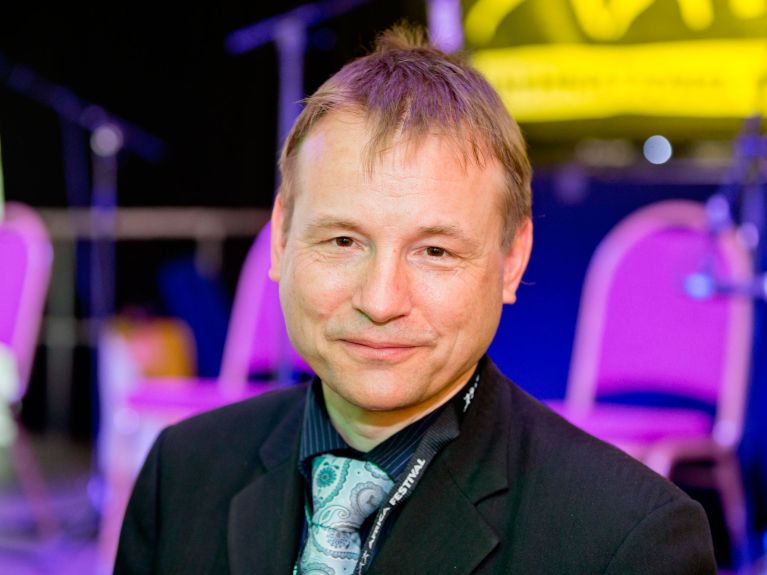Don’t look away, be active
How the legacy of Nelson Mandela influences Germany’s new partnership with Africa.

He is an icon of humanity: On 18 July 2018 Nelson Mandela would have turned 100. With his unflinching stance against racism and for social justice the freedom fighter and later president of South Africa overcame apartheid. He was honoured for his efforts in 1993 with the Nobel Peace Prize. What can we derive from Mandela’s legacy for Germany’s partnership with Africa? Georg Schmidt, since 2014 Regional Director for Sub-Saharan Africa and the Sahel at the German Federal Foreign Office, explains.

Ambassador Schmidt, the 100th anniversary of Nelson Mandela’s birth is being celebrated with a festive concert in Berlin. What does Nelson Mandela stand for today?
Nelson Mandela’s staunch efforts against apartheid, racism and social injustice rightly radiate far beyond the continent of Africa. He is a global icon, among other things because he showed that hatred cannot be overcome by hatred but by empathy. That is why Federal Foreign Minister Heiko Maas will personally attend the festive concert. There is a commemorative postage stamp in honour of Nelson Mandela that has been jointly designed by Germany and South Africa.
To this day, we can learn important lessons from this for our Africa policy: One must not turn a blind eye when human rights get massively violated, but instead be active. And that always requires a lot of tenacity, as the battle against apartheid shows. Nelson Mandela always also considered the social dimension. When he was president, South Africa committed to conflict resolution on the continent of Africa, for example in Burundi. We continue to need strong African partners. Germany can and will support this process.
And another last important message from Mandela: At the height of power, in 1998, he did not run for president again, but stepped aside to clear the way for peaceful change. A highly symbolic act.
German policy on Africa is taking a new approach. What does the “Marshall Plan with Africa” envisage?
The Marshall Plan hinges on a stronger concentration and stronger conditionalities for development cooperation. However, the change in German policy on Africa goes far beyond the Marshall Plan. Very many initiatives commenced in 2017: The Compacts with Africa within the G20, the Pro!Afrika initiative, the migration partnerships. A red thread runs through all of them: Sustainable growth will not be achieved in Africa by transfers of government funds alone. Rather, private capital must be mobilized. This will originate not only from abroad, but from within Africa, too. The financial transfers from Africa outwards show that the continent is not poor. But the majority of the inhabitants are. Meaning we must both support German companies in finding their way to Africa and also make sure that framework conditions on the continent improve, too. That includes above all championing peace, democracy and the rule of law.
The document outlining the “Cornerstones of a Marshall Plan with Africa” indicates that each year 50 billion euros flow into Africa as development financing, while 50 billion US dollars are illegally withdrawn from Africa. How can that be fundamentally changed?
There are many other financial flows that should be taken into consideration as well. For example, the money transferred from the African diaspora back to the continent far exceed the volume of development cooperation. To prevent illegal financial transfers you need a coordinated global approach and to that end we need cooperation outside the EU, too.
Moreover, a fundamental change also requires a change of mindset in Africa itself: With more democracy and transparency, citizens will no longer tolerate money being laundered. It is scandalous that in Congo with all its agricultural opportunities and mineral resources millions of people depend on support from outside.
Africa is referred to as the “Continent of opportunities”. What opportunities do you discern?
I don’t set much store by such simplifications – be it the “Continent of opportunities” or the “Continent of crises”. They simply do not do justice to Africa’s diversity.
Fortunately we are already seeing that an increasing number of German companies are interested in doing business in Africa. Since 2017 we have been hosting the German African Business Summit, which brings together a lot of energy. The next one will take place in Ghana in 2019. The German Federal government has increased its export credit coverage under the Hermes system. The network of foreign chambers of commerce in Africa has been expanded. In 2017, Germany overtook France as Africa’s largest EU trading partner. But the opportunities have certainly not been exhausted.
Foreign Minister Heiko Maas on the centenary of the birth of Nelson Mandela
Interview: Martin Orth
